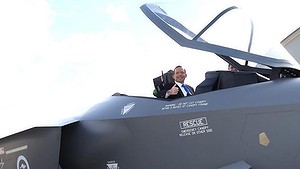This shouldn't be a political issue.
The program has been delayed through technical difficulties. These were ordered under Howard and were supposed to be in the process of delivery by now. Rudd/Gillard deferred the actual payment for these aircraft because of the the delays, they didn't cancel the project as such. As the project comes to fruition and we start getting deliveries we will have obviously to pay for them.
Whether you think the fighter is any good or not, it's the only thing that's available to a smallish country like Australia. There aren't any alternatives to look at buying.
As for numbers, they are replacing 70-odd early model F/A-18 Hornets, so this announcement today brings the total to 71, which sounds about right. To be effective we need to operate these aircraft in significant numbers, having only a handful of them makes no sense.
The program has been delayed through technical difficulties. These were ordered under Howard and were supposed to be in the process of delivery by now. Rudd/Gillard deferred the actual payment for these aircraft because of the the delays, they didn't cancel the project as such. As the project comes to fruition and we start getting deliveries we will have obviously to pay for them.
Whether you think the fighter is any good or not, it's the only thing that's available to a smallish country like Australia. There aren't any alternatives to look at buying.
As for numbers, they are replacing 70-odd early model F/A-18 Hornets, so this announcement today brings the total to 71, which sounds about right. To be effective we need to operate these aircraft in significant numbers, having only a handful of them makes no sense.





